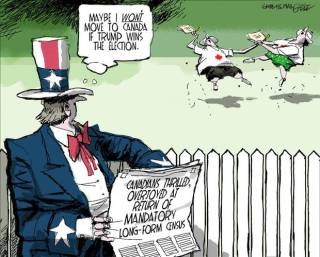Public health reporter Andre Picard contests an Ontario court’s decision to allow a First Nations woman the right to choose traditional healing methods for her child against the advice of doctors at McMaster Children’s Hospital. The latter claim that the child has a good chance of being cured by chemotherapy and without it, she has no chance of survival. In rendering its decision, the court affirmed applicable aboriginal rights under the Constitution Act of 1982. In an article entitled “Ontario hospital cannot force chemo on 11-year-old native girl, court rules” (November 14, 2014), author Kelly Grant details the ruling and the reaction from the Six Nations Band representatives.
Appropriate Subject Area(s):
Social studies, history, health, current events
Key Question(s) to Explore:
- What kinds of legal and societal issues do parents need to consider when making health-care choices for their dependent children?
New Terminology:
Leukemia, chemotherapy, lymphoblastic, paradigm, dereliction, Jehovah’s Witnesses, precedence, carte blanche, holistic, epiphany
Materials Needed:
Globe article, the Internet
Time required: One full period plus a homework assignment
Introduction to lesson and task:
The recent Ontario court decision in favour of an aboriginal mother’s right to choose alternative treatment for her cancer-stricken child raises important questions about parental rights and obligations in caring for their children. In this case, the issue turns on a Constitutional right, but the issue has broader implications as parents are increasingly challenging mainstream science or medicine in favour of lesser-known alternative therapies.
For many decades Canadians welcomed the advancements of modern health science—treatments for cancer and cardiovascular disease, for example. Although there have always been small pockets of resistance from certain religious or cultural groups, most Canadians have accepted and welcomed new treatments, as well as immunization programs that protected them from diseases that had ravaged previous generations.
In recent years, however, likely in part because of the ubiquitous use of the Internet, more people have become resistant, not to the diseases, but to the treatments for them and inoculations against them. Alternative medical remedies are flourishing and public campaigns against immunization are becoming more common. As a result, diseases such as measles, mumps, whooping cough and chicken pox are making a significant comeback.
This lesson plan provides a framework for an informal class debate on the key issue: What rights and responsibilities do parents and/or caregivers have when they consider treatment/immunization for children?
Action (lesson plan and task):
Engage students in a short discussion to introduce the lesson. These questions will focus the exercise:
Show of hands: How many of you are in favour of getting a flu shot? Why or why not?
If your child were diagnosed with a serious disease, would you choose mainstream medical assistance—drugs, for example—or would you choose alternative treatments, such as dietary changes, naturopathy (a form of alternative medicine employing a wide array of “natural” treatments, including homeopathy, herbalism, and acupuncture, as well as diet and lifestyle counselling–Wikipedia) or homeopathy (a system of alternative medicine created in 1796 by Samuel Hahnemann based on his doctrine that like cures like, whereby a substance that causes the symptoms of a disease in healthy people will cure similar symptoms in sick people–Wikipedia)?
Students will likely already have positions and opinions on these issues. After a short discussion, have volunteers read both articles and then present the following research and informal debating assignment. Have students work in pairs or small groups, as you prefer. Be prepared to clarify terms in the articles as needed or review them first, from the new terminology list, above.
Using the Internet, conduct some basic research into these questions:
- Are children in Canada allowed to choose or refuse their own medical treatment? Are there any special considerations, such as the age of the child, or on its capacity to choose?
- Are parents/caregivers, who are not members of an aboriginal First Nation, allowed to choose or refuse potentially life-saving treatment for their dependent children?
- What are the specific rights of First Nations’ parents/caregivers under the Canadian Constitution Act of 1982?
Note that this part of the exercise is based on what the laws/rules currently allow and not on what you think they ought to be.
Include explanations for when a child is considered capable of making decisions on his or her own, as well as the rights of parents of special groups, such as religious groups or a member of a First Nation.
- http://www.cps.ca/documents/position/treatment-decisions (Canadian Pediatric Society)
- http://www.cba.org/bc/public_media/health/422.aspx (Canadian Bar Association)
- http://www.cpso.on.ca/policies-publications/policy/consent-to-medical-treatment (College of Physicians and Surgeons of Ontario)
- http://indigenousfoundations.arts.ubc.ca/home/government-policy/constitution-act-1982-section-35.html (Constitution Act, 1982, Section 35)
Ask for volunteers to provide answers to the research questions.
You likely will not have time for a class discussion on the findings. You may reserve this for the following class period when students can refer to their homework assignment, below.
Consolidation of Learning:
- Constructive discussion around the issues using relevant evidence and arguments.
Success Criteria:
- Successful completion of the research and writing assignment.
Confirming Activity:
- Assign a short writing assignment, a paragraph or two, in which students answer this question: Are you in favour of or against mandatory immunization programs? Provide reasons and, if you used the Internet, relevant links in support of your position.

